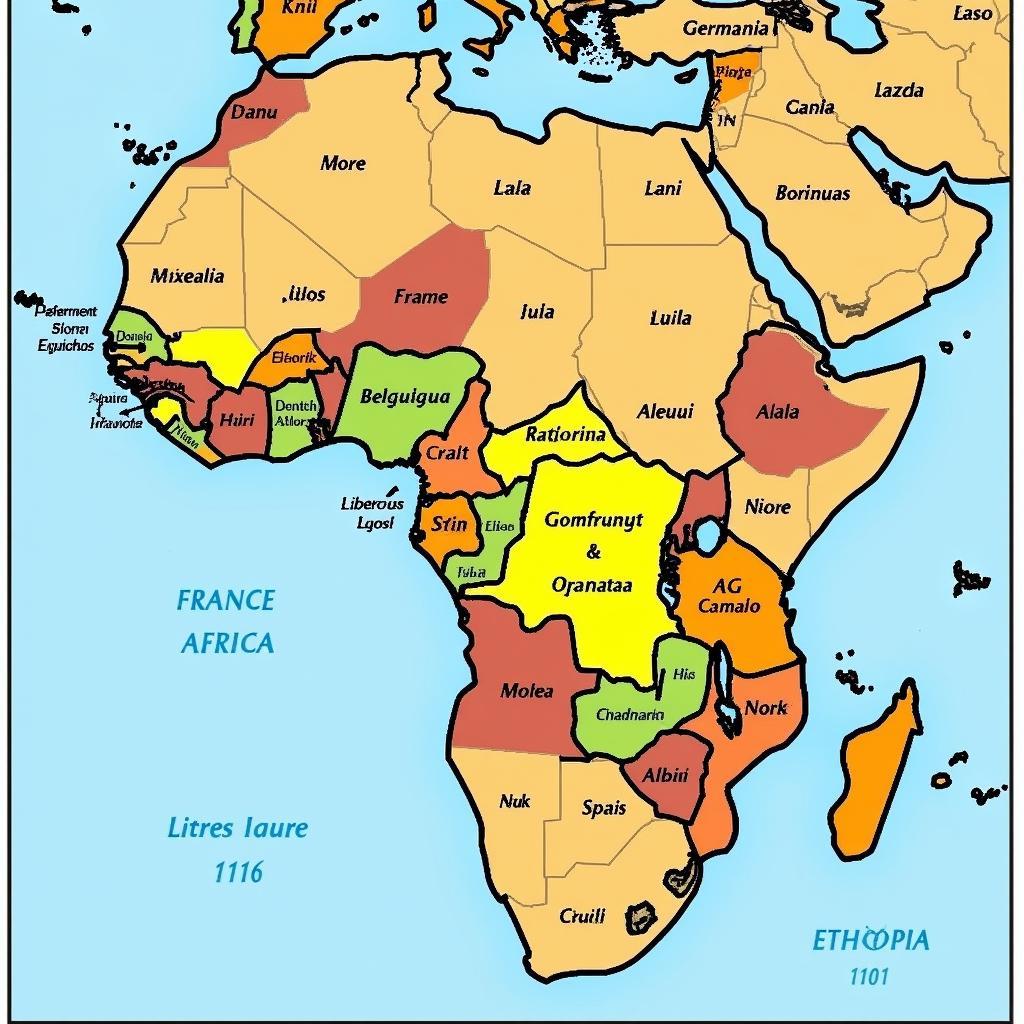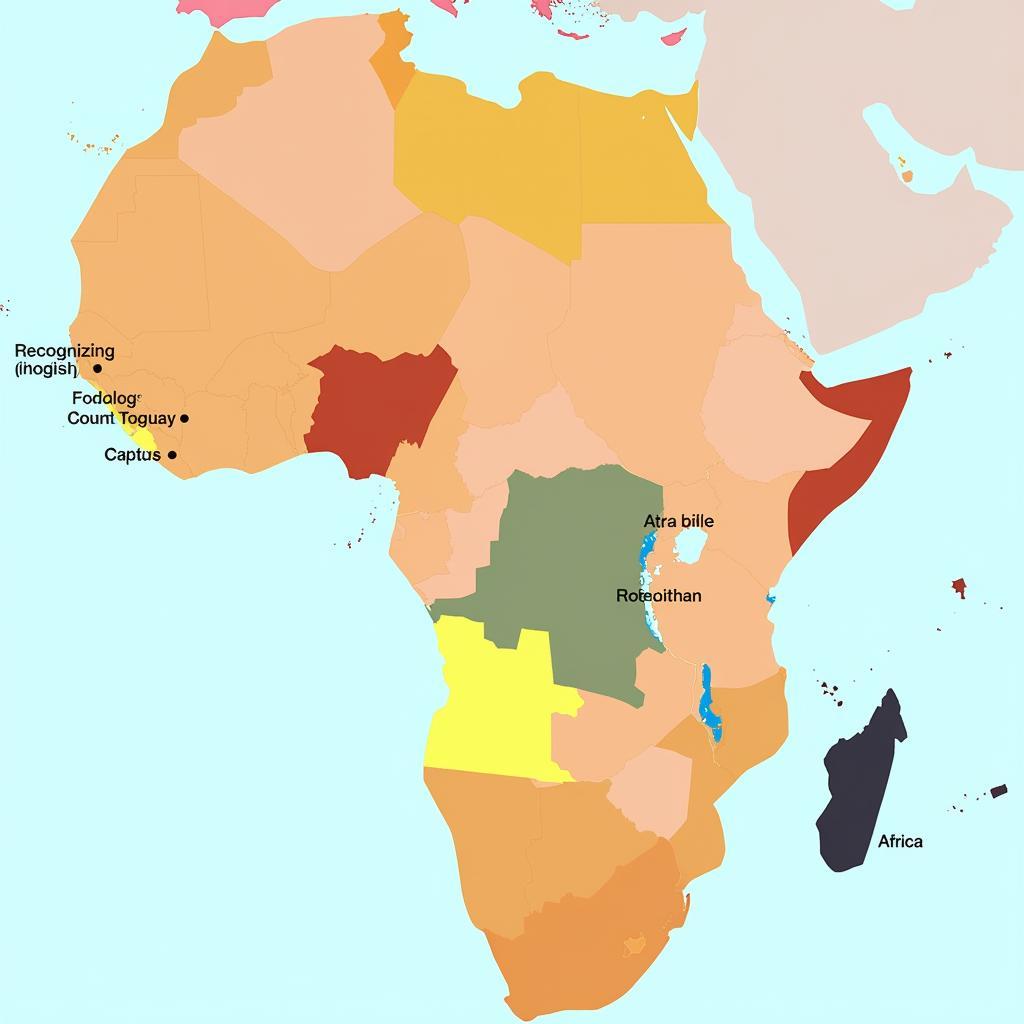African Colonies in 1914: A Continent Divided
The year 1914 marked a critical point in African history. African colonies in 1914 were largely under European control, a result of the “Scramble for Africa” that had intensified in the late 19th and early 20th centuries. This period witnessed the carving up of the continent, leaving only Liberia and Ethiopia independent. This control had profound and lasting impacts on the continent’s political, economic, and social landscapes.
 Map of African colonies in 1914 showing European control
Map of African colonies in 1914 showing European control
The Scramble for Africa: A Brief Overview
The late 19th century saw European powers aggressively compete for African territories, driven by economic interests, political rivalries, and a sense of imperial ambition. The Berlin Conference of 1884-1885 formalized this process, establishing rules for the acquisition and division of African lands. This conference, ironically, took place without any African representation, solidifying the continent’s subjugation to external forces. By 1914, the vast majority of Africa was under European rule, with only Liberia and Ethiopia retaining their independence.
What were the driving forces behind this land grab? European powers sought raw materials, new markets for their goods, and strategic advantages. The abundance of resources like minerals, rubber, and ivory fueled their desire to exploit the continent’s wealth.
Which Countries Held African Colonies in 1914?
Several European powers held significant territories in Africa in 1914. Great Britain, France, Germany, Portugal, Belgium, Italy, and Spain all controlled vast swathes of land, each imposing their own administrative systems and policies.
- Great Britain: Controlled territories from Egypt in the north to South Africa in the south, including present-day Nigeria, Kenya, and Sudan.
- France: Primarily held territories in West and North Africa, including Algeria, Morocco, and Senegal.
- Germany: Controlled territories in East and Southwest Africa, including present-day Tanzania, Namibia, and Togo.
- Portugal: Held colonies in Angola, Mozambique, and Guinea-Bissau.
- Belgium: Controlled the Congo Free State, notorious for its brutal exploitation of resources and people.
- Italy: Held colonies in Libya, Eritrea, and Somalia.
- Spain: Maintained a presence in North Africa, primarily in Moroccan coastal areas.
The Impact of Colonial Rule
The imposition of colonial rule dramatically reshaped African societies. Traditional political structures were disrupted, economies were reoriented to serve European interests, and new social hierarchies emerged. The exploitation of resources and forced labor became commonplace, contributing to widespread poverty and social unrest.
What were the long-term effects of the African colonies in 1914?
The legacy of the african colony 1914 is complex and far-reaching. The arbitrary borders drawn by European powers continue to shape political boundaries today, often contributing to ethnic tensions and conflict. Colonial economic policies hindered the development of local industries, creating dependency on former colonial powers.
Dr. Amina Mwangi, a renowned historian specializing in African colonial history, states, “The impact of 1914 cannot be overstated. It was a year that solidified the colonial project in Africa, setting the stage for decades of struggle and resistance.”
Life in Colonial Africa
Life under colonial rule varied significantly across the continent, depending on the specific policies of the ruling power and the local context. However, certain common themes emerged, including the suppression of indigenous cultures, the introduction of new languages and educational systems, and the development of infrastructure primarily to facilitate resource extraction. African communities demonstrated resilience in the face of these challenges, maintaining their cultural identities and finding ways to resist colonial control.
Professor Kwame Nkrumah, a prominent scholar of African studies, emphasizes, “While colonial rule imposed significant hardships, it also inadvertently sowed the seeds of African nationalism and the eventual fight for independence.”
Conclusion
African colonies in 1914 represent a pivotal moment in the continent’s history. Understanding the complexities of this period, the motivations of the European powers, and the profound impact on African societies is crucial for comprehending the continent’s contemporary political, economic, and social landscapes. The legacy of 1914 continues to shape Africa today, reminding us of the enduring consequences of colonialism and the ongoing struggle for self-determination.
FAQ
- What was the Scramble for Africa?
- Which countries were not colonized in 1914?
- What was the Berlin Conference?
- What were the main motivations for European colonization of Africa?
- How did colonialism impact African societies?
- What were the long-term consequences of colonialism in Africa?
- What forms of resistance did Africans employ against colonial rule?
Other Questions We’ve Covered:
- How did World War I impact African colonies?
- What were the different administrative systems used by European powers in Africa?
- How did African cultures adapt and resist colonial influence?
For further assistance, please contact us at Phone: +255768904061, Email: kaka.mag@gmail.com or visit us at Mbarali DC Mawindi, Kangaga, Tanzania. We have a 24/7 customer service team.



